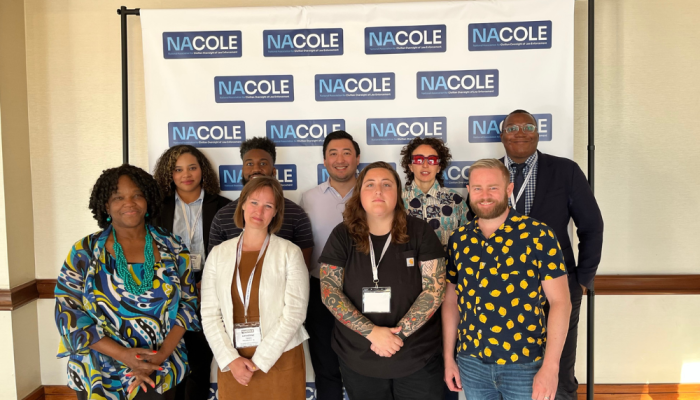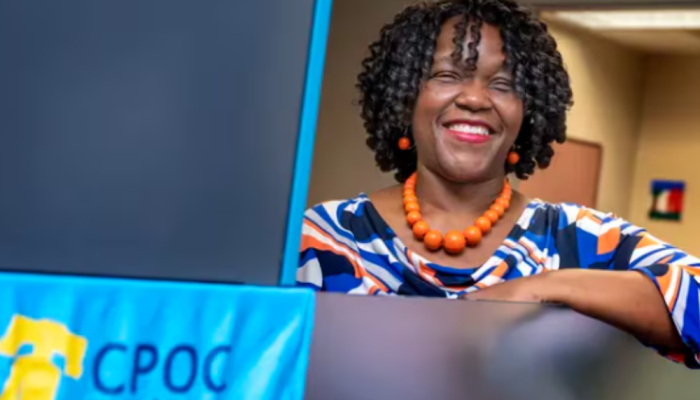CPOC staff attended the 24th Annual National Association for Civilian Oversight of Law Enforcement (NACOLE) conference in Tucson, Arizona, in October. NACOLE is a non-profit organization that works to build community support for independent civilian oversight entities that seek to make their local law enforcement agencies, jails, and prisons more transparent, accountable, and responsive to the communities they serve. CPOC staff members engaged in a variety of sessions, such as:
- Advancing Justice: Emerging Topics in DOJ Civil Rights Investigations
- Transparency, a Bridge to Trust & Collaboration: How Oversight Agencies Can Share Information with Impacted Families, the Public, and Media
- Law Enforcement Interactions with Persons Experiencing Behavioral Health Crisis: Exploring Alternative Response Models
- Overcoming Obstacles: Strategies for Effective Civilian Oversight of Law Enforcement
- The Prosecutor and Police Oversight: Seeking Alignment
- The Intersection of Criminal Defense Litigation and Police Oversight
- Transforming Policy Through Storytelling
Hear from CPOC Staff on their experience at the conference:
What were your biggest takeaways?
“An inspiring moment was meeting the chairman of Detroit’s oversight agency, who, like me, was wrongfully convicted. Detroit’s agency, which can hire the police chief as well as fire bad actors within the department, has built trust with both the community and the police department. This highlights the importance of community engagement for all oversight agencies.” – Interim Chair Hassan Bennett
“Solidarity with oversight agencies around the country! We all face barriers and obstacles. We can learn from each other’s challenges and successes.” – Catherine Twigg (General Counsel)
“I was particularly drawn to the discussions on the challenges of data consistency and how standardization could facilitate cross-agency comparisons and enhance accountability. The emphasis on creating a uniform set of data points and definitions resonated with my ongoing work at CPOC and underscored the need to refine our own data processes to align with national best practices.” – Allison Teti (Policy/Data)
“As a growing agency, CPOC has the capacity to do much more, especially in outreach. We have to find creative ways to make our agency sustainable and truly independent.” – Giriana Hernandez (Outreach)
“I went to the session Quantitative Data as Evidence in Investigations of Biased Policing: Opportunities and Challenges. They presented a lot of exciting information involving data and investigations. It created a lot of wonderful takeaways for how CPOC can improve our work and increase what data we can share.” – Daniel Guy (Administration)
What was your favorite part?
“My favorite part was a panel on police arbitration discussed how difficult it is to correct wrong arbitration decisions, and gave a shout out to Philadelphia as a studied example of how arbitrators may ignore the plain meaning of the contract between the police union and the city, and the arbitrators’ decision cannot be appealed or corrected. It was an eye-opening presentation.” – Nick Kato (Director of Investigations)
“My favorite part of the conference was the “Law Enforcement Misconduct Data: Standards and Working Towards ‘Standardization’” session. This session focused on the importance of data reporting standards and explored the various data points generated throughout the complaint process.” – Allison Teti (Policy/Data)
What similarities in terms of struggles, successes, etc, did you find in other oversight agencies?
“Many agencies were fighting to advance from an agency that primarily functions as a review or audit board into an independent agency with broad investigative powers. And sometimes, agencies granted broad investigative powers were fighting to define to continue review or auditing functions after being legislatively preempted.” – Laila Khalil (Policy)
“CPOC is doing really important work and has made a lot of good strides in the last few years to enhance oversight in Philadelphia. Being with our peers you quickly see the shared struggle for creating reform, and it makes you really value the victories our office has been able to achieve, like our participation in the PBI process.” – Daniel Guy (Admin)
What would you like CPOC to accomplish in the next few years to strengthen oversight in Philadelphia?
“I hope CPOC can create and establish a data sharing agreement with the Philadelphia Police Department in the near future. This can increase community trust with this added level of transparency.” – Giriana Hernandez (Outreach)
“CPOC should be allowed to conduct independent investigations and perform the oversight functions that Philadelphians voted to enact into the Home Rule Charter.” – Lalia Khalil (Policy)
“I envision a move towards establishing a standardized data framework that supports comprehensive trend analysis that ensures consistency and comparability. Strengthening our data collection, storage, and reporting methodologies, as well as incorporating a triangulated approach would enhance the credibility and impact of our findings.” – Allison Teti (Policy/Data)
Our Executive Director, Tonya McClary, is working towards getting staff members certified by NACOLE as “Certified Practitioners of Oversight.” Staff members that have attended NACOLE conferences in the past few years are working towards earning the certification. CPOC is looking forward to attending next year’s conference in Minnesota!




